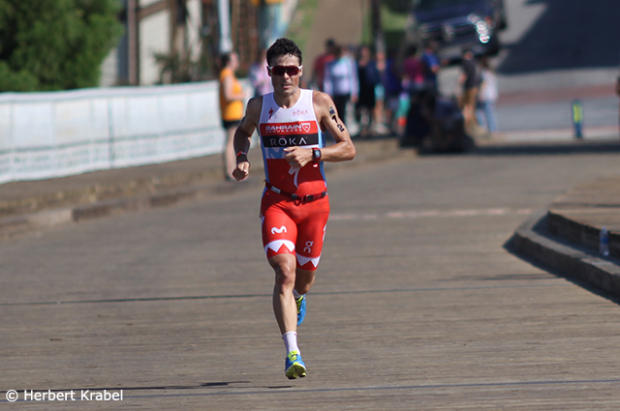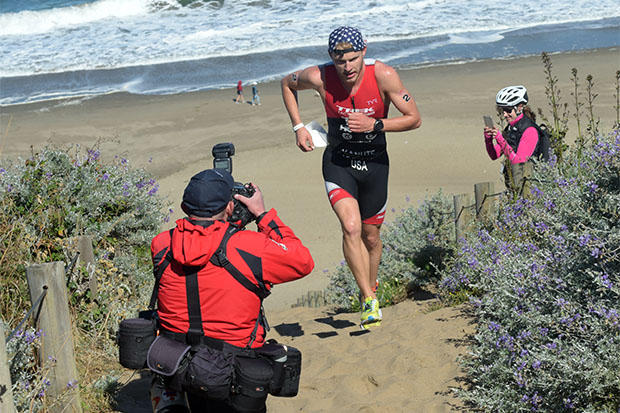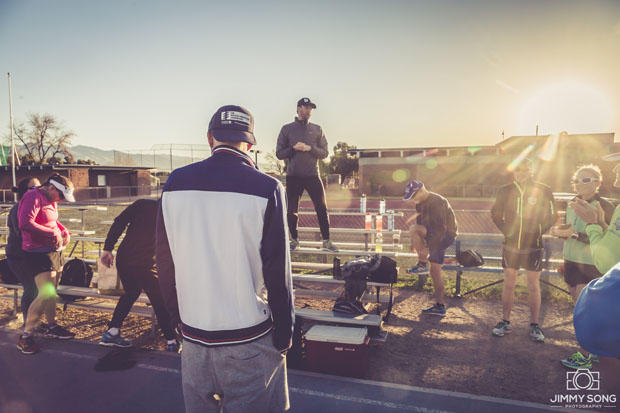Ben Kanute’s big breakthrough at Chattanooga
Ben Kanute is still young – 24 – with a long career ahead. He made the Olympics quite early and probably anticipates more WTS success in his future. And yet, his best WTS and World Cup results this year include a 15th at WTS Abu Dhabi, 36th at WTS Hamburg, 22nd at WTS Edmonton sprint, and 23rd at WTS Montreal Olympic distance. In 70.3 races it’s a different story. He scored an impressive 3rd at Puerto Rico 70.3 and a notable 5th at St George 70.3.
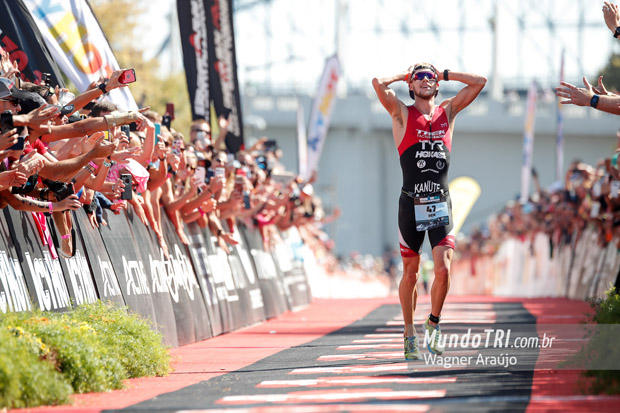
His silver medal performance behind Javier Gomez at Ironman 70.3 Worlds would be THE career highlight for many.
So should the man who has been struggling to crack the top 10 at WTS Olympic distance races pack up and focus on 70.3 races where is already at the top? Kanute says no.
Needing a faster run in WTS and 70.3 races, Kanute recognizes that that this is no time to simply ramp up the mileage and focus on 70.3 racing. Taking gold as part of the U.S. Mixed Relay World Championship in 2016 – and the inclusion of this event in the 2020 Olympics – gives him encouragement to keep up a variety of distances as the path to a longer, better career.
Slowtwitch: How did you progress so fast in 70.3 racing?
Ben Kanute: I think that I have made big improvements this year overall as an athlete. My coach Jim Vance and I have found a rhythm that has been getting results. I think that the ITU races were a little lackluster in how I finished, but the way I executed was spot on. We did a fairly good job at balancing the wide range of distances, and my run is slowly but surely improving. It does not show as much in the half distance, but it does quite a bit in ITU. I think I will benefit in the long run (70.3 and non-draft) from trying to perform well at the ITU races because it will force me to supplement my swim/bike combo with a good run.
ST: Do you think your 70.3 training and racing will benefit your WTS racing more? Or will your WTS racing benefit your 70.3 racing more?
Ben: I think they complement each other well. The strength in 70.3s helps at the end of the ITU races and the foot speed and intensity gives me a bit of an edge in 70.3s. I did some conjugate sequencing this year where we cycled a block starting with about a week of strength/base, then a week of intensity, and then some rest. I responded to this well, and we will take what we learned this year to apply it to training and preparing more specifically for next year.
ST: Seeing how you kamikaze the swim and bike on the WTS circuit and ride up front at races like the Olympics, how did you develop such a strong swim and bike?
Ben: I grew up swimming on a club team, so I got a lot of yardage and practice racing in the swim. I think swimming builds the engine, and that transferred over into biking well. Growing up, those tended to be my two favorites as well, so that helped. These two you can really put some progress on it at a young age. I think the years of work started to pay off as I developed.
ST: How have you worked on your run with Jim Vance?
Ben: We decided to train me like a miler at times, then the opposite, like a half marathoner. I did a lot of foot speed work, and I think you see my improvement in the super sprints like Hamburg where I ran with Dorian Coninx for a mile, and in the half marathon in Chattanooga where I ran steady and built into the run.
ST: Your 10k run splits in 2017 and 2016 included 33:36 at Montreal, 35:07 at Abu Dhabi and 35:01 at the Rio Olympics. But you also ran 30:52 at 2016 Yokohama. Can you put those very different splits into perspective?
Ben: Half of those runs were pretty sub-par. In Rio I was smashed by the time I hit the run, and there were some nutrition issues at Abu Dhabi. My run in Yokohama I came off the bike with the field and kept a respectable gap. I think a lot of people have an infatuation with splits and especially run splits. It is obviously very important, but in a race like Montreal, the race played out differently. We had a minute gap, and while I didn't "seal the deal," some of the runners suffered and guys from our break finished high despite extra fatigued legs. This is the strategy I go for – making the race hard and taking the zap out of the pure runners’ legs.
ST: After two years of WTS focus, do you fear you have hit a wall on your Olympic distance 10k run? Do you think, as Dirty Harry famously said: “Man’s got to know his limitations?” Or do you think you might have a sub 30 minute 10k in your future?
Ben: I think jumping to sub 30 is a bit of a stretch with where I am at right now. I am still seeing my 1 mile, 5km, 10km threshold pace all come down, so I think I have room to improve. The biggest thing this year has been consistently executing on the run and not having these super highs and then super lows. I don't see why I couldn't run 31 minutes consistently or even approach 30 minutes as I continue to improve. Then it's taking advantage of my strengths and shaking the runners up on the swim and bike to get the best result.
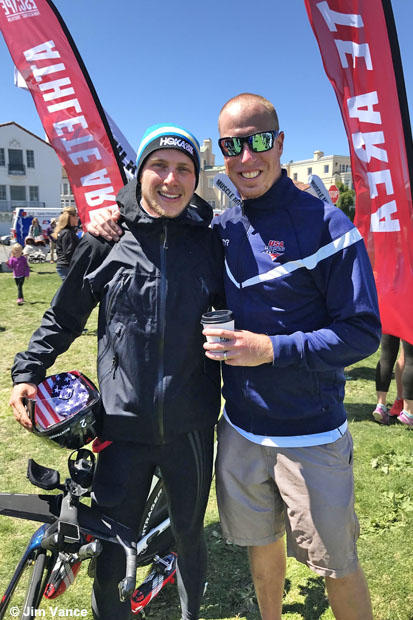
ST: What did Jim Vance do to prepare you for a career breakthrough performance at Chattanooga?
Ben: We put in a good training block beforehand and understood what I was capable of going into the race. Chattanooga was not special in any way where I performed above my process goals. I nailed the swim effort and the bike was right where we planned to be. My run [1:16:24] was just about there too, based on what I was training. It was a breakthrough because I cleanly executed the plan and took advantage of the situations during the race. Those guys sitting up deciding not to push helped put me on the podium and not a couple spots off.
ST: What did he do to create a belief that you could win this race against the likes of Javier Gomez, Tim Don, Sebastian Kienle, et al?
Ben: Consistent training. I put in the time and knew my zones and what I could hold. I knew it would at least challenge those guys. I have massive respect for all of those names and the guys who were trying to run me down. However, I step onto every start line with a plan to win and/or maximize my place. This was one of those days that my plan just happened to give me an amazing outcome. There was a chance I executed perfectly and I would walk away with 6th, and that is why I have process goals along with outcome goals; to define success when the outcome may not be what you want.
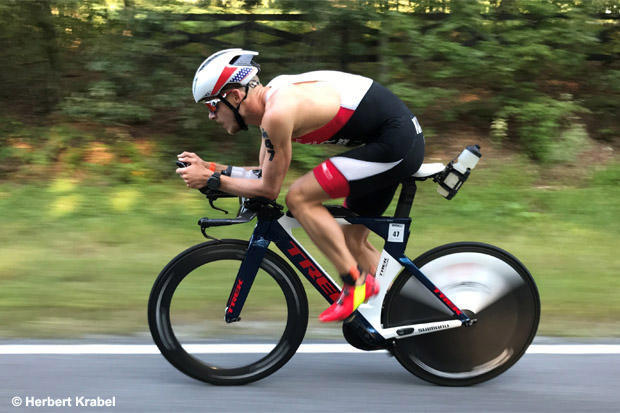
ST: When you got out of the swim just ahead of Javier Gomez, what was your plan to deal with him on the bike? What were your watts goals in this first section?
Ben: I wanted to push hard to the top of Lookout Mountain. I broke it down. The first 5 miles are essentially flat to the base. I pushed about 350 or 360, right at the top of my half Ironman watts. Then on the climb I brought them up. I can ride 400 for 10 to 15 min, especially when rested. The actual climb is about 1.5 miles of steep and I had a 55 seconds lead on Gomez. After that there was a break, then it kicks up again and might stair step a bit, so there were areas to recover and catch my breath real quick. It wasn't a constant 400 watt effort. From the top there were some descents to get a few minutes of recovery, and I had enough training data to know I could sustain that effort and then recover on the descent.
ST: Knowing you have often swim and ride with the leaders at WTS races until the run, how much of a lead did you think might be enough to have a shot at the win?
Ben: I knew I could run 1:14 to 1:16. I wasn't sure how much, but when I heard I had a 3:50 lead at T2, I knew I had a real shot. But Gomez was just too good.
ST: How important was it to have a challenging hill early on the bike leg? On a flat course, could you have done as much damage?
Ben: I think having a hill anywhere on the course would be good. On a flat course the group starts to roll better than someone solo, but even on the flat part on the way into town in Chattanooga I didn't lose much time.
ST: What did your win at Escape from Alcatraz in June – with one of your aces, the swim was canceled – tell you about your potential?
Ben: It was confirmation that I did not need one of my biggest strengths to win a race. It was a huge confidence booster for me.
ST: After your 2:08:11 bike split that gave you a 3:50 lead at Chattanooga, how tired were you? Did that cast doubt on your ability to podium? Or did it give you confidence that you had worn down your World Champion pursuers?
Ben: I was pretty tired. I took the last few miles relatively easy to try to make sure I had the legs to run a half marathon. I just took it one mile at a time and knew the guys behind me needed a really fast run to catch me.
ST: When you held off Gomez until Mile 8, did that give you confidence?
Ben: Mile 8 is just long enough to feel proud of the time holding off one of the greatest triathletes of all time, and to also realize there are still 5 miles to go and trying to go with him could be catastrophic. I picked it up a bit, but he made sure to pass me with enough speed to let me know who the boss was.
ST: What was your most nerve wracking moment of doubt or pain in the race?
Ben: At about mile 9 or 10 of the run, not knowing how far behind Tim [Don] was, and if he was alone or in a group. I just wanted to make it to the top of the last hill with a big enough gap so I could hold it.
ST: Coming down the last 5 miles, did you have a renewal of energy knowing you still had a 2 minute gap on your pursuers – World Champions Kienle, Don, and stars like Appleton, Clavel, Butterfield?
Ben: I had some splits but was never sure until I crossed the bridge [with a mile to go]. I got a lot of splits and some sounded better than others. So I just kept running my race trying to bring it home.

ST: When you hit the line, what did you feel?
Ben: Still trying to find the words. It was amazing. I think I wore my emotions on my sleeve in that finish chute.
ST: What did Gomez and Don say to you?
Ben: They were all class. They congratulated me and mentioned some stuff about the race. Most of that is a blur.
ST: What made the difference?
Ben: I had a good training camp, a good support crew at the race, a solid plan that I executed, and I think the race played out in my favor. Pretty much a perfect day.
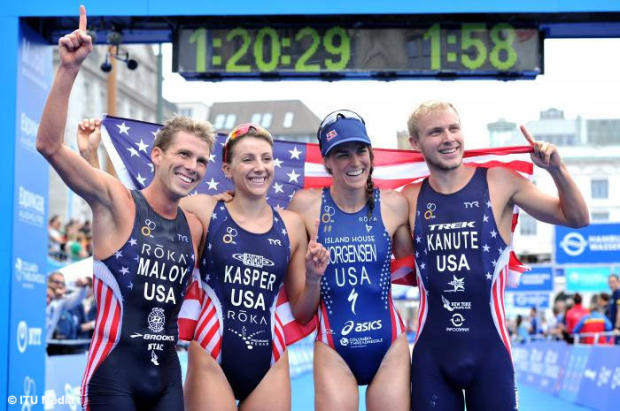
ST: What is in your future? Does your 2016 Mixed Team World Championship gold medal make that event at the Olympics look brightest to you?
Ben: Hopefully! We will see exactly what is in store, but I know I am racing everything from super sprint MTR races to 70.3 and everything in between. I love the variety! I love the relay too because it is one of the few times in triathlon where you have a real team effort. I also get pretty excited about the short distance!
ST: I see you had an understandable letdown at the WTS Grand Final in Rotterdam. I hear you were invited to round 2 of the Super League in Jersey and also to the third year at Island House. Good luck in those sprint distance clashes!
Ben: Thanks.


